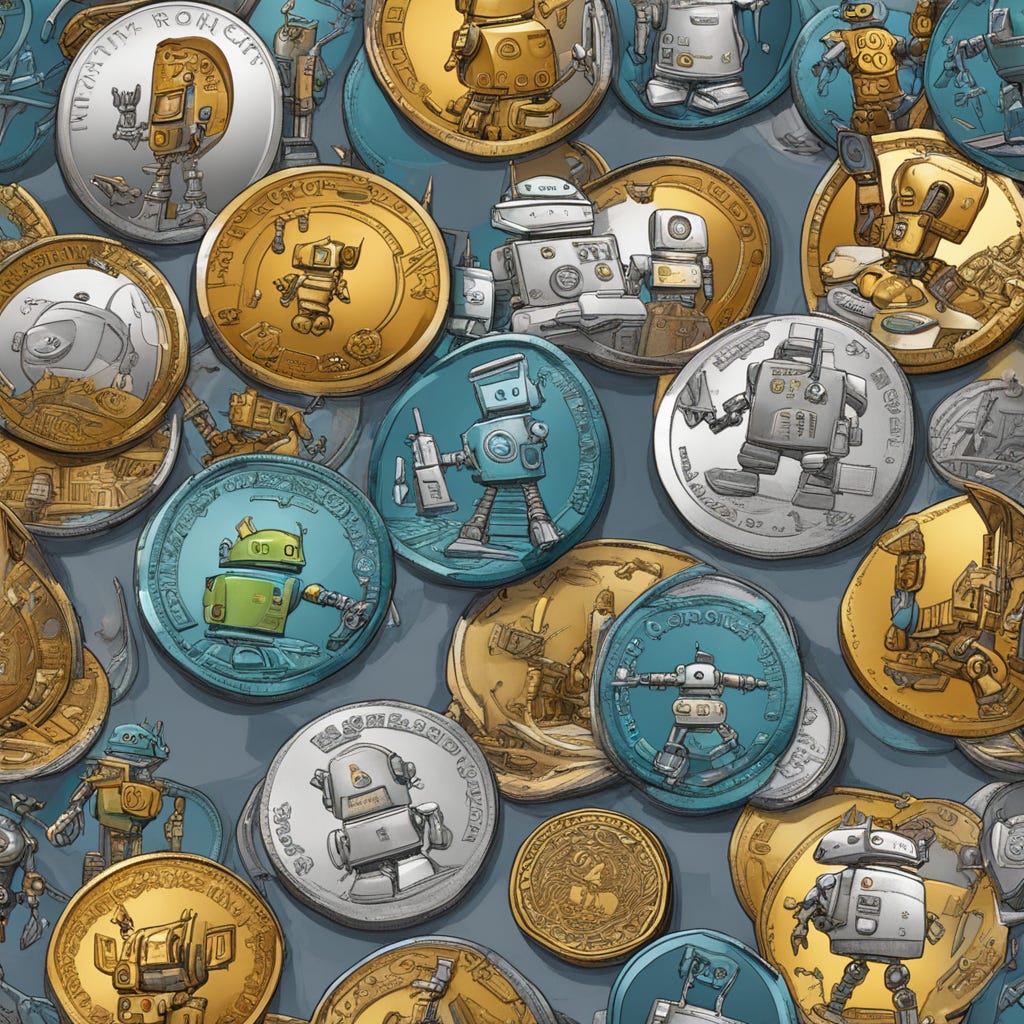Using Smart Contracts and Jumping Joojoos
What's a token smart contract, anyway?
NOTE: For the basics of pursuing criminals on the blockchain, see my previous post What Blockchains can Tell that Bankers Can't (substack.com)
SECTIONS:
Persistent Scripts
Ethereum and similar blockchains have a further functionality that makes them more than just a glorified account book. They can run "smart contracts" – basically computer programs on the blockchain. This allows for many applications to be built on Ethereum, especially when smart contracts communicate with and build on each other. In a Microsoft Excel spreadsheet, they would be the formulas and macros. Examples of simple applications are automating monthly payments, having escrow addresses that automatically release funds once specified conditions are met, creating virtual tokens (more on this later), etc. In fact, because of smart contracts, the Ethereum network as a whole acts as one, global computer --the Ethereum Virtual Machine1 – powered by its native 'currency', Ether.
Smart contracts can be coded and published by anyone to the Ethereum blockchain, and once there every user can use it, forever. Smart contracts also have cryptocurrency addresses, but instead of just values, it would also contain instructions. Think of again Microsoft Excel cells (crypto addresses) containing formulas (smart contracts) for the macros. There are no private keys for using smart contracts; they are executed by sending Ether to them.
Just to note, smart contracts aren't really smart, and they for sure aren't legal agreements between parties. The Ethereum network merely follows what's programmed in smart contracts. It’s more accurate to call them "persistent scripts" that are saved forever on the blockchain network, as principal Ethereum co-founder Vitalik Buterin wished he had originally named them2.
Nothing is Free
Running a blockchain is not free. (The internet isn't free either.) Why would thousands of people spend money on a high-end computer consuming electricity all day, to act as Ethereum network nodes for the benefit of the world? It is because all of them believe in the promise of Ethereum. Also, it is because they all earn a small amount of Ether when validating transaction blocks.
Every transaction sent to the Ethereum blockchain needs to be paid for with a bit of Ether as 'gas' fees, part of which goes to node operators as thank you. (In Bitcoin the fees are called miner fees because transaction validators are called ‘miners’, for mechanistic reasons.) Doing anything that will result in a state change on the Ethereum blockchain costs gas. For example:
sending Ether
publishing smart contracts to the blockchain
executing a smart contract (e.g. to transfer tokens)
You can increase the gas you pay to bribe the validators / miners to prioritize processing your transaction faster. Gas fees get more expensive the more transactions get sent into the network, so gas actually also help prevent mindless spamming of the network.
What is a Token
Smart contracts allow the creation of tokens to represent anything: US dollars, game rewards points, stocks, real estate, art, voting rights, bragging rights, membership in a cult, tokens for a laundry machine, you name it. Specifically, they represent ownership of something that is tracked on a blockchain ledger. Therefore, tokens can be bought, sold, traded and of course, speculated. People often use the term ‘token’ interchangeably with ‘coin’. Here ‘token’ will be used interchangeably with ‘joojoo’.
Skip This If You Don’t Want to Understand How Joojoos Work
A joojoo is created through smart contracts. Say that you want to create a joojoo representing a Jejemon. You call it the JUJU Coin. You’ll write a smart contract saying how much supply of JUJU there will be on the blockchain and what extra things JUJU does. You then publish your joojoo smart contract to the blockchain, which costs gas for the memory space. Gas for deploying a joojoo smart contract can range from around $200 for the most basic joojoos with just the required standard functions3 (e.g., a name function, a total supply function, ‘transfer’ function, etc), to thousands of US dollars for joojoos with very complex smart contracts and big egos.
The JUJU smart contract also maps all the crypto addresses that have JUJU. To transfer JUJU, you must pay gas to the JUJU smart contract to run the transfer function that you wrote inside it. Again, everything in Ethereum costs gas. In effect, you are telling the Ethereum blockchain through the JUJU smart contract to subtract, say, 800 JUJU coins from a sender address and add 800 JUJU coins to the recipient address.
Imagine that you are paying a robot (Ethereum), who can now speak JUJU (smart contract), to move JUJUs, whenever you want to move JUJUs.
Whether you transfer 80 JUJU or 8,000,000 JUJU costs about the same amount of gas. It is just gas to execute the transfer function in the JUJU smart contract.
Jumping the USDT Joojoo
The most popular joojoo in the world is USD Tether or USDT. It is pegged to the value of the US dollar, so one thousand USDT joojoos should be as good as $1,000 in bills. Theoretically the equivalent $1000 USD is locked in some bank in the Bahamas4, ready to back up any redemption request. Theoretically. (It’s a long story5, bro.) The issuing Tether company, registered in empty offices and P.O. boxes in Hongkong6, guarantees that the billions of dollars of USDT have equivalents in real USD.
A purported use for USDT is as a ‘stable’ store of value for cryptocurrency traders, to get away from volatile Bitcoins, Ether or Dogecoins, when resting. It is virtually for cashing out casino chips. This is why it is called a stable joojoo or stablecoin.
There are other stablecoin issuers now like USDC, GUSD and PayUSD, but arguably, the more popular use of USDT’s is for illicitly moving USD across borders, US borders included. (Another long story, for future post.)
Anyway, one thing law enforcement should know is that stablecoins like USDT have centralized control. The Tether company manages the USDT smart contract, and that the Tether smart contract has functions to effectively blacklist crypto addresses from ever transferring its USDT, i.e. freeze USDT wherever they are. This is true for almost all other stablecoins.
So, police with warrants can conceivably freeze and seize USDT anywhere. No need to wait for suspect USDT to hit an exchange before pouncing.
****** ********
UP NEXT: Ethereum has no God.
alidfnisdfni;fjhrgijagvigh[9wr80w\wirhg’oiehgo;
There is a set of standard functions called ERC-20 that all Ethereum token developers should now follow. Hence, the ERC-20 Token Standard | ethereum.org




